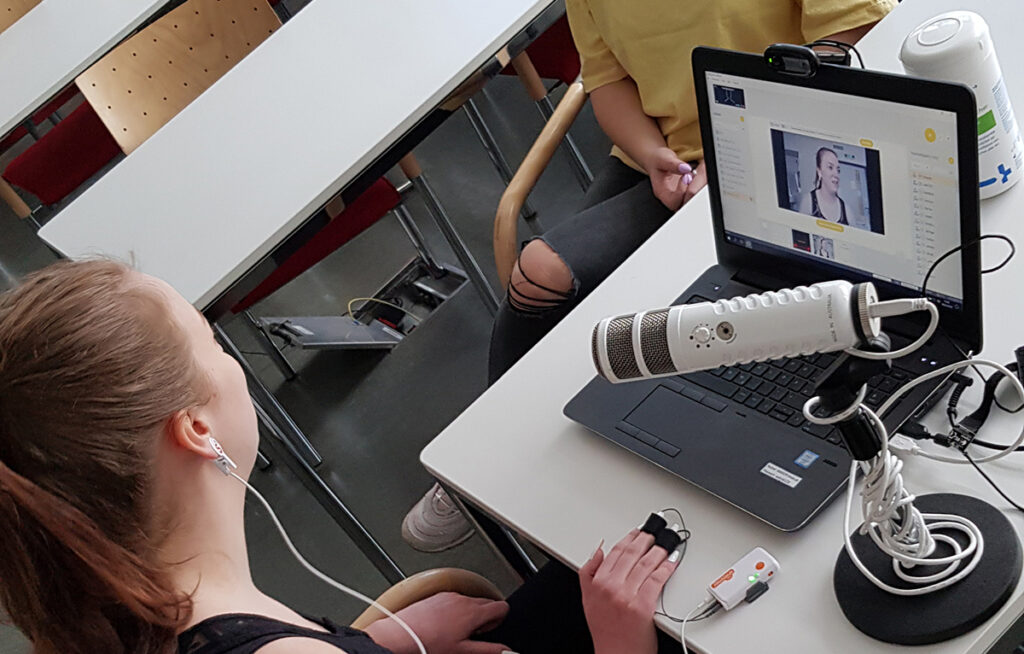At FHWien der WKW a special kind of sales training is offered: Biometric Sales Coaching. The scientific article about this innovative didactic method has now been published in the Journal of Selling.
Professional sales negotiations are an important element in successful customer management. FHWien der WKW offers a special kind of sales training for this purpose: Students from the Bachelor’s program in Marketing & Sales have the opportunity to simulate sales negotiations and gain deeper insights into the course of the conversation and the associated emotions by collecting biometric data. This innovative didactic setting has already received the 2019 Award for Innovative Teaching from FHWien der WKW. The method has now been recognized by international experts and published in the Journal of Selling under the title “Embedding Automated Emotional Analysis into Role-Playing Exercises: Benefits for Sales Education and Training”.
Poker face or rather show emotions?
One would think that sales negotiations in particular should be fact-based and conducted as objectively and neutrally as possible – i.e. without emotion – in order to actually achieve sales success. But a poker face is not necessarily helpful here. A sales conversation is an interaction between people. It contains verbal, but also non-verbal elements, which have to be taken into account. In addition to sales arguments, subtle emotional messages via non-verbal communication, such as facial expressions, also influence the interlocutor. The goal of every sales conversation should therefore be to create a pleasant atmosphere, to build trustworthiness and to convey empathy. This is not possible without emotions.
Emotional intelligence can be learned
It is important that salespeople understand the role of emotions and can also direct them, thus see their emotional inventory as a tool for bargaining. It has been proven that emotional intelligence can be learned through specific training. This is exactly what the students of the Bachelor’s program in Marketing & Sales are taught in the lecture “Customer Management and Sales Negotiations” by means of biometric sales coaching.
Before the start of the sales simulation, a personality survey is conducted. Afterwards, biometric data of the salesperson is collected during the simulated sales conversation by means of skin resistance measurement and face recognition. In the next step, a standardized online survey is used to determine how both participants perceived the negotiations, followed by focused oral peer feedback. Finally, detailed personal feedback and coaching is provided by the instructors. Students also give detailed written feedback to each other in the final step. The goal is to achieve sales excellence in sales negotiations.
Web Analytics Lab analyzes emotions using Face Recognition
The Web Analytics Lab at FHWien der WKW provides the technical equipment for the collection and analysis of this biometric data. The software recognizes the changes in the most important facial features such as eyebrows, eyes and lips and calculates the probability of the seven basic emotions, namely joy, surprise, anger, sadness, disgust, fear and contempt.
The results exemplify how emotions are reflected in behavior during a sales conversation (e.g. anxious salespeople take more notes) and how certain emotions influence buyers’ perceptions (e.g. joy has a positive impact on salespeople’s evaluations). By confronting students with very tangible examples, they learn how to recognize emotions by analyzing the gestures and facial expressions of the other person and respond accordingly.
>> Read the scientific article
Contact:
| FH-Prof.in Mag.a Dr.in Ilona Pezenka | David Bourdin, BA MSc |
| Senior Researcher | Teaching & Research Associate |
| Marketing & Sales Management Study Programs | Competence Center for Marketing |
| Phone: +43 690 40 476-110 | Phone: +43 690 40 476-074 |
| ilona.pezenka@fh-wien.ac.at | david.bourdin@fh-wien.ac.at |
